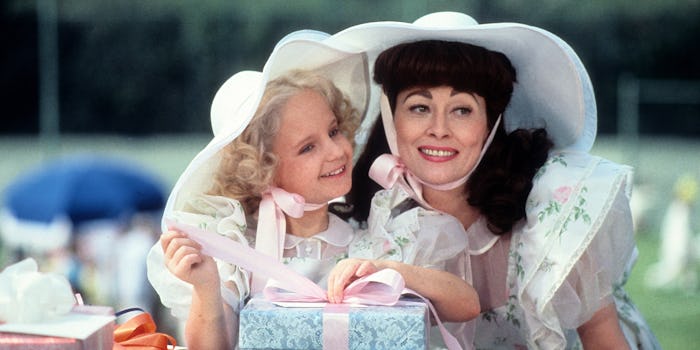Life

9 Ways To Avoid Being A Toxic Parent, Because 'Mommie Dearest' Is Not Aspirational
In many ways, I grew up with toxic parents. As a result, it’s become very important to me that I learn how to avoid being a toxic parent myself. I don’t want to have an unhealthy relationship with my child because I know how hard it can be. My mother was of the “not intentionally malevolent but incredibly self-centered” variety of toxic parent, as opposed to the type that is explicitly abusive. And although it’s definitely different, that toxicity affected me long into adulthood, and still has an effect on me today. On the plus side, having an example of the kind of parent I don’t want to be has given me a great way to monitor my own behavior — generally, I do the opposite of what my mother would have done in any given situation.
What’s been nice to watch is that, as I’ve set explicit boundaries around my own parenting, my mother has (to some extent) respected those boundaries. My commitment to non-toxic parenting in my house has helped my mother demonstrate healthier behavior with my daughter. If you’re someone who tends to have co-dependent tendencies or whose identity comes from external relationships instead of internal confidence, it can be easy to fall into toxic parenting patterns. But, if you know what you look for, you can avoid falling into the trap of toxicity and can manage to have a healthy relationship with your children.
1Encourage Your Child To Be Their Own Person
Your child is who they are, and not your vision of who your child should be. Imposing your will on your child can be damaging to their sense of self. That means letting them wear what they want, even if you think it’s horrifically ugly and you bought them something else to wear instead. It means letting them choose their activities, be it computer programming, soccer, ballet, or chess club. And it means supporting them and cheering them on, too, so they know you respect their choices.
2Allow Your Child To Have Secrets (As Long As They’re Not Dangerous)
A toxic parent is one who acts more like a friend than a parent. A toxic parent will insist that their children tell them everything. But you don’t need to know every little thing your child thinks or does during their day. It’s healthy for kids to have secrets, to build their own lives and their own worlds. As long as your child isn’t keeping a secret that could hurt someone, it’s OK to let them have a hidden diary or not tell you how their day at school was.
3Let Your Child Mess Up
How do you react when your child makes a mistake? Toxic parents get angry or upset, and reprimand their kids when they mess up. But everyone makes mistakes, and allowing your child to be human and fallible is important. Plus, letting them fail will help them to ultimately succeed.
4Have Age Appropriate Expectations
It’s necessary to have realistic expectations of your child(ren). Abusive parents hold their kids to standards that are well beyond those children’s years. For example, expecting a 2-year-old to be potty trained or being angry that a toddler can’t sit quietly through an entire meal. Read up on developmentally appropriate behavior, and have patience with your little one.
5Talk To Them
Instead of yelling when things don’t happen the way you want them to, try sitting your child down and talking to them. If they’re having a meltdown, maybe it’s about something bigger than the fact that they can’t have the toy they want. And maybe it isn’t, and they have to learn to feel frustrated and that it’s OK to feel frustrated. Toxic parents yell about things without ever stopping to get their children’s side of the story. But kids have a lot to tell us, and having conversations can go a long way.
6Don’t Burden Them With Your Problems
A hallmark of toxic parents, according to Susan Forward’s book by the same name, is one who expects their child to take care of them, instead of the other way around. It is not the child’s job to wonder where rent money will come from, or why Uncle John won’t talk to the family. Remember that kids don’t have the same perspective that we do, and small problems may seem giant, and they can take on a very large feeling of responsibility that no child should have to shoulder.
7 7. Be Careful With Bribes
Bribing a child with M&Ms to go potty: not toxic. Bribing a child with money or toys to stay quiet or keep secrets: toxic.
8Cut The Cord
Your child will grow up one day, and hard as it may be, you have to be able to let them go. It starts small, with allowing them playdates at friends’ houses without you there, progresses to dropping them off at the movie theater, and culminates in giving them a curfew and trusting them to come home. But it goes beyond that, too, to college and adulthood. Your job as a parent is to raise a child capable of being an independent adult, not one who is 25 and still needs you to do everything for them.
9Respect Their Boundaries
Children can set boundaries from the time they’re small. Toxic parents walk all over a child’s boundaries, not respecting when a child doesn’t want to talk or needs to be alone.
Images: Paramount Pictures; Giphy (9)